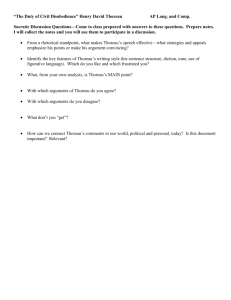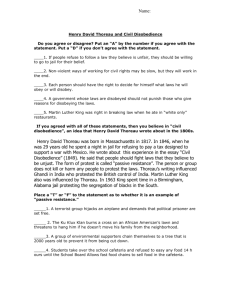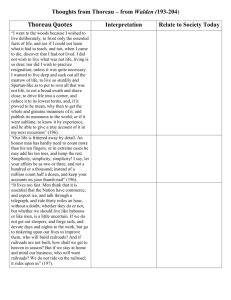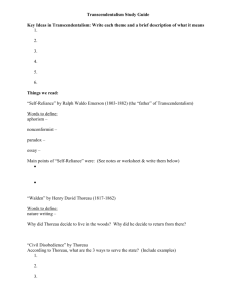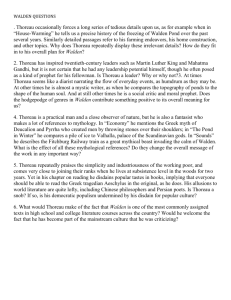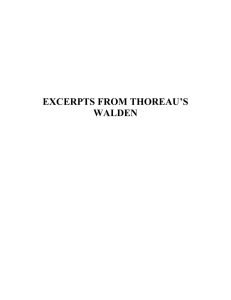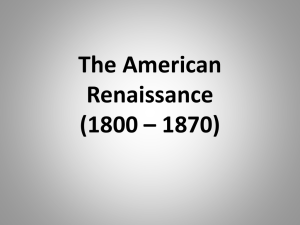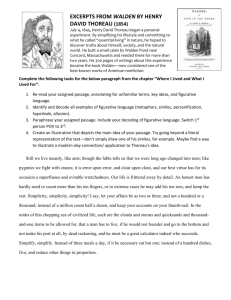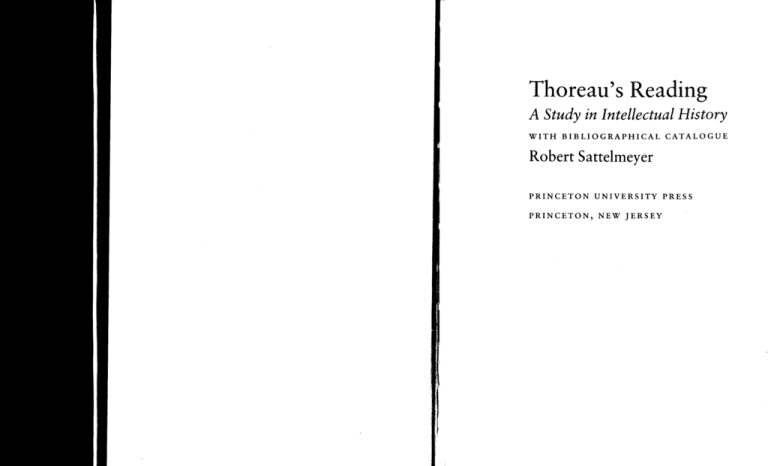
Thoreau's Reading
A Study in Intellectual History
WITH BIBLIOGRAPHICAL CATALOGUE
Robert Sattelmeyer
PRINCETON UNIVERSITY PRESS
PRINCETON, NEW JERSEY
For Sue
Copyright ©1988
by Princeton University Press
Published by Princeton University Press,
41 William Street, Princeton, NewJersey 08540
In the United Kingdom:
Princeton University Press, Guildford, Surrey
All Rights Reserved
Library of Congress Cataloging in Publication Data
Sattelmeyer, Robert .
Thoreau's reading.
Bibliography: p.
Includes index.
1 . Thoreau, Henry David, 1817-1861-Books and reading.
z. Thoreau, Henry David, 18i7-1861-Knowledge and learning .
3. Thoreau, Henry David, 1817-186z-Library-Catalogs .
PS3057 .B64Sz7 1988
818' .309
88-1491
ISBN o-691-06745-7
This book has been composed in Linotron Sabon
Clothbound editions of Princeton University Press
books are printed on acid-free paper,
and binding materials are chosen for strength and durability .
Paperbacks, although satisfactory for personal collections,
are not usually suitable for library rebinding
Printed in the United States of America
by Princeton University Press
Princeton, New Jersey
I. Title.
For Sue
Copyright ©1988
by Princeton University Press
Published by Princeton University Press,
41 William Street, Princeton, NewJersey 08540
In the United Kingdom:
Princeton University Press, Guildford, Surrey
All Rights Reserved
Library of Congress Cataloging in Publication Data
Sattelmeyer, Robert .
Thoreau's reading.
Bibliography: p.
Includes index.
1 . Thoreau, Henry David, 1817-1861-Books and reading.
z. Thoreau, Henry David, 18i7-1861-Knowledge and learning .
3. Thoreau, Henry David, 1817-186z-Library-Catalogs .
PS3057 .B64Sz7 1988
818' .309
88-1491
ISBN o-691-06745-7
This book has been composed in Linotron Sabon
Clothbound editions of Princeton University Press
books are printed on acid-free paper,
and binding materials are chosen for strength and durability .
Paperbacks, although satisfactory for personal collections,
are not usually suitable for library rebinding
Printed in the United States of America
by Princeton University Press
Princeton, New Jersey
I. Title.
Contents
Preface I ix
Abbreviations l xv
CHAPTER I
Harvard
College,
1833-183713
CHAPTER 2
The Early
Transcendental Apprenticeship, 1837-1844125
Walden and Beyond, 1845-1849 / 37
Literary
Career
CHAPTER 3
From
Exigencies and Opportunities, 1849-1850 / 54
A Week
Shifting Emphases, 185o-1854 / 66
to Walden
CHAPTER 4
Natural History / 78
The Later
Literary
Civil History / 9z
Career
Aboriginal History / 99
Bibliographical Catalogue / 111
Index of Short Titles / 297
Bibliography / 326
Index / 329
Contents
Preface I ix
Abbreviations l xv
CHAPTER I
Harvard
College,
1833-183713
CHAPTER 2
The Early
Transcendental Apprenticeship, 1837-1844125
Walden and Beyond, 1845-1849 / 37
Literary
Career
CHAPTER 3
From
Exigencies and Opportunities, 1849-1850 / 54
A Week
Shifting Emphases, 185o-1854 / 66
to Walden
CHAPTER 4
Natural History / 78
The Later
Literary
Civil History / 9z
Career
Aboriginal History / 99
Bibliographical Catalogue / 111
Index of Short Titles / 297
Bibliography / 326
Index / 329
Preface
T H I S V 0 L U M E consists of an analytical overview of the principal
developments in Thoreau's reading during the course of his career
from 1833, when he matriculated at Harvard, to his death in 1862,
and a bibliographical catalogue of his reading during the same years.
The catalogue is organized conventionally by author and title, and
contains standard bibliographical data as well as information about,
Thoreau's source for particular items, when known, and citations of
the references to each work in his writings . It is followed by an index
of short titles . I have included not only works quoted or referred to in
Thoreau's writings for publication and in his journal, but also works
cited in his unpublished notebooks and commonplace books and in his
correspondence, his library charging records, his required texts at Harvard, and of course the catalogue of his personal library. At the same
time that I have tried to be comprehensive, however, I have also been
fairly restrictive in defining what constitutes "reading I have ex."
cluded works alluded to without sufficient particularity to indicate direct acquaintance, and works proposed by scholars as "possible
sources" for passages in his writings-unless, again, there is corroborating evidence of his having actually read them . Similarly, titles Thoreau listed for future reference or study are not included .' Books, articles in periodicals or collections, pamphlets, and, wherever traceable,
articles in newspapers and other ephemeral publications are all included .
Both sections of this book are intended to serve as primary tools for
the study of Thoreau's thought and art, but the expository section is
r . The most extensive of these lists of works he planned to consult may be found in
the endpapers of the various Indian books (see abbreviations for Bibliographical Catalogue, pp . 1114- 115) ; see also Kenneth Walter Cameron, "Ungathered Thoreau Reading Lists," in The Transcendentalists and Minerva, 3 vols . (Hartford : Transcendental
Books, 1958), 2 .359-388 .
Preface
T H I S V 0 L U M E consists of an analytical overview of the principal
developments in Thoreau's reading during the course of his career
from 1833, when he matriculated at Harvard, to his death in 1862,
and a bibliographical catalogue of his reading during the same years.
The catalogue is organized conventionally by author and title, and
contains standard bibliographical data as well as information about,
Thoreau's source for particular items, when known, and citations of
the references to each work in his writings . It is followed by an index
of short titles . I have included not only works quoted or referred to in
Thoreau's writings for publication and in his journal, but also works
cited in his unpublished notebooks and commonplace books and in his
correspondence, his library charging records, his required texts at Harvard, and of course the catalogue of his personal library. At the same
time that I have tried to be comprehensive, however, I have also been
fairly restrictive in defining what constitutes "reading I have ex."
cluded works alluded to without sufficient particularity to indicate direct acquaintance, and works proposed by scholars as "possible
sources" for passages in his writings-unless, again, there is corroborating evidence of his having actually read them . Similarly, titles Thoreau listed for future reference or study are not included .' Books, articles in periodicals or collections, pamphlets, and, wherever traceable,
articles in newspapers and other ephemeral publications are all included .
Both sections of this book are intended to serve as primary tools for
the study of Thoreau's thought and art, but the expository section is
r . The most extensive of these lists of works he planned to consult may be found in
the endpapers of the various Indian books (see abbreviations for Bibliographical Catalogue, pp . 1114- 115) ; see also Kenneth Walter Cameron, "Ungathered Thoreau Reading Lists," in The Transcendentalists and Minerva, 3 vols . (Hartford : Transcendental
Books, 1958), 2 .359-388 .
x
Preface
less neutral an instrument than the catalogue. Obviously, principles of
selection came into play, and the essay as a whole reflects my judgment
about major developments and shifts in Thoreau's interests during his
life . I was especially concerned to trace the course of his reading in
disciplines-history and natural history, for example-that were of increasing importance to him as he grew older but that have received
relatively scant attention from scholars previously. Concomitantly, I
felt that I could afford to devote less attention proportionately to other
of his interests that have already received extensive treatment: Oriental
scriptures and philosophy, the subject of Arthur Christy's The Orient
in American Transcendentalism (193 z) and a host of subsequent studies; travel literature, treated by John Aldridge Christie's Thoreau as
World Traveler (1965) ; and his classical studies, the topic of Ethel Seybold's Thoreau: The Quest and the Classics (1951) . None of these
works pretended to have treated its subject exhaustively and much remains to be done in all three areas, but I have written my introduction
to Thoreau's reading on the assumption that the reader will be familiar
with or will want to consult these standard works.
Otherwise, I have tried in the introductory essay to assemble the bits
of evidence furnished by his reading of particular texts as though they
were the pieces to a puzzle in intellectual history, the putting together
of which would provide a picture not only of Thoreau's shifting interests over the years but also of his participation in the life of his times,
of his engagement with some of the most pressing and controversial
issues of mid-nineteenth-century American literature and culture: the
tension between conventional, classical literary culture and the new
views of literary nationalists and Transcendentalists ; the nature and
destiny of America itself (in the context of a period of unbridled expansionism) ; the rights and responsibilities of government, society,
and individuals, and the points at which they collided with one another, especially over the issue of slavery and governmental authority;
the history, nature, and destiny of native Americans (in the cultural
context of dispossession and genocide) ; and the escalating scientific
controversies of the age that pitted apologists for special creation and
design against the gathering forces of materialist and positivist interpretations of nature . Despite his reputation as an iconoclast who withdrew from or was harshly critical of his age (a pose reinforced by his
modern reputation as a detached and meticulous craftsman), Thoreau
was a writer who participated fully if idiosyncratically in his age, and
there is less a contradiction here than may at first appear . It took someone widely familiar with newspapers and the level of current events
described in them to compose the marvelous critique of the popular
press in Walden, and the same holds true for many of his other targets,
xi
Preface
from the railroads to politics to the gold rush . The satirist and social
critic is of necessity profoundly affected by and implicated in his age,
whatever his rhetorical stance toward it may be. And if we look past
the monumental preeminence of Walden, it is apparent that Thoreau
was a man of letters whose writing treats a wide variety of subjects,
each more or less reflecting major preoccupations of his times : politics,
reform, government, literature, travel, the Indian, wilderness, history,
natural history, even sexuality.
Even more fundamental to my purpose, however, is the fact that
Thoreau was a writer, and as such the primary tools of his trade were
the works of other writers. As a thoroughgoing Transcendentalist, he
could echo Emerson's scorn for the book when it was held up as a
sacred object and the truly sacred inspiring force behind the bookthe act of creation itself-was lost sight of. And he was careful, likewise, to avoid disclosure of many of his own most important sources,
in order to preserve the bloom of originality in his works. But in other
moods, especially in the privacy of his journal, he could express an
almost Jamesian sense of the enormous richness of accumulated history and tradition out of which the serious writer works. After going
through the shelves of the Harvard Library in 1852 in search of the
essential books on the early exploration of Canada, he mused: "Those
old books suggested a certain fertility, an Ohio soil, as if they were
making a humus for new literature to spring in. I heard the bellowing
of bullfrogs and the hum of mosquitoes reverberating through the
thick embossed covers when I had closed the book. Decayed literature
makes the richest of all soils" ()L 3 .353).
Of an innately scholarly cast of mind, Thoreau read widely, deeply,
and eclectically ; and as he grew older he kept more and more extensive
notes on his reading, although he had begun the practice of systematic
note taking in college. As any careful reader of Walden knows, his
writings reflect this bookish side no less than his love of outdoor life.
One of the principal obstacles for students reading the book today, in
fact, is what appears to be a bewildering thicket of allusions to everything from relatively obscure classical mythology to contemporary
pseudo-science (the "Symmes Hole" of the conclusion). Virtually all
the Transcendentalists were energetic readers, in spite of their proclamations of disdain for convention and tradition, and Thoreau, if he
lacked the deep knowledge of the German literature and philosophy
that was so seminal to the movement-the kind of familiarity that
Margaret Fuller or Theodore Parker possessed, for example-was
more deeply read in other subjects (notably classical and early English
literature, American history, and natural science) than any of his circle .
He drew upon this reading in all the obvious and not-so-obvious ways
x
Preface
less neutral an instrument than the catalogue. Obviously, principles of
selection came into play, and the essay as a whole reflects my judgment
about major developments and shifts in Thoreau's interests during his
life . I was especially concerned to trace the course of his reading in
disciplines-history and natural history, for example-that were of increasing importance to him as he grew older but that have received
relatively scant attention from scholars previously. Concomitantly, I
felt that I could afford to devote less attention proportionately to other
of his interests that have already received extensive treatment: Oriental
scriptures and philosophy, the subject of Arthur Christy's The Orient
in American Transcendentalism (193 z) and a host of subsequent studies; travel literature, treated by John Aldridge Christie's Thoreau as
World Traveler (1965) ; and his classical studies, the topic of Ethel Seybold's Thoreau: The Quest and the Classics (1951) . None of these
works pretended to have treated its subject exhaustively and much remains to be done in all three areas, but I have written my introduction
to Thoreau's reading on the assumption that the reader will be familiar
with or will want to consult these standard works.
Otherwise, I have tried in the introductory essay to assemble the bits
of evidence furnished by his reading of particular texts as though they
were the pieces to a puzzle in intellectual history, the putting together
of which would provide a picture not only of Thoreau's shifting interests over the years but also of his participation in the life of his times,
of his engagement with some of the most pressing and controversial
issues of mid-nineteenth-century American literature and culture: the
tension between conventional, classical literary culture and the new
views of literary nationalists and Transcendentalists ; the nature and
destiny of America itself (in the context of a period of unbridled expansionism) ; the rights and responsibilities of government, society,
and individuals, and the points at which they collided with one another, especially over the issue of slavery and governmental authority;
the history, nature, and destiny of native Americans (in the cultural
context of dispossession and genocide) ; and the escalating scientific
controversies of the age that pitted apologists for special creation and
design against the gathering forces of materialist and positivist interpretations of nature . Despite his reputation as an iconoclast who withdrew from or was harshly critical of his age (a pose reinforced by his
modern reputation as a detached and meticulous craftsman), Thoreau
was a writer who participated fully if idiosyncratically in his age, and
there is less a contradiction here than may at first appear . It took someone widely familiar with newspapers and the level of current events
described in them to compose the marvelous critique of the popular
press in Walden, and the same holds true for many of his other targets,
xi
Preface
from the railroads to politics to the gold rush . The satirist and social
critic is of necessity profoundly affected by and implicated in his age,
whatever his rhetorical stance toward it may be. And if we look past
the monumental preeminence of Walden, it is apparent that Thoreau
was a man of letters whose writing treats a wide variety of subjects,
each more or less reflecting major preoccupations of his times : politics,
reform, government, literature, travel, the Indian, wilderness, history,
natural history, even sexuality.
Even more fundamental to my purpose, however, is the fact that
Thoreau was a writer, and as such the primary tools of his trade were
the works of other writers. As a thoroughgoing Transcendentalist, he
could echo Emerson's scorn for the book when it was held up as a
sacred object and the truly sacred inspiring force behind the bookthe act of creation itself-was lost sight of. And he was careful, likewise, to avoid disclosure of many of his own most important sources,
in order to preserve the bloom of originality in his works. But in other
moods, especially in the privacy of his journal, he could express an
almost Jamesian sense of the enormous richness of accumulated history and tradition out of which the serious writer works. After going
through the shelves of the Harvard Library in 1852 in search of the
essential books on the early exploration of Canada, he mused: "Those
old books suggested a certain fertility, an Ohio soil, as if they were
making a humus for new literature to spring in. I heard the bellowing
of bullfrogs and the hum of mosquitoes reverberating through the
thick embossed covers when I had closed the book. Decayed literature
makes the richest of all soils" ()L 3 .353).
Of an innately scholarly cast of mind, Thoreau read widely, deeply,
and eclectically ; and as he grew older he kept more and more extensive
notes on his reading, although he had begun the practice of systematic
note taking in college. As any careful reader of Walden knows, his
writings reflect this bookish side no less than his love of outdoor life.
One of the principal obstacles for students reading the book today, in
fact, is what appears to be a bewildering thicket of allusions to everything from relatively obscure classical mythology to contemporary
pseudo-science (the "Symmes Hole" of the conclusion). Virtually all
the Transcendentalists were energetic readers, in spite of their proclamations of disdain for convention and tradition, and Thoreau, if he
lacked the deep knowledge of the German literature and philosophy
that was so seminal to the movement-the kind of familiarity that
Margaret Fuller or Theodore Parker possessed, for example-was
more deeply read in other subjects (notably classical and early English
literature, American history, and natural science) than any of his circle .
He drew upon this reading in all the obvious and not-so-obvious ways
xii
Preface
that reading affects writing, and in the introductory essay I have speculated both upon the influence of particular works on his own writing
and upon his basic orientation to the various contemporary disciplines
according to which his interests may be classified . I have attempted to
place him, as much as possible, in his times and to assess his studies in
the contexts provided by the disciplines as they then existed rather
than by what we now know about them or by current theory or methodology.z
Ralph Cudworth, whose True Intellectual System of the Universe
was one of the eclectic philosophical works Thoreau read with Emerson in the early r84os, expressed a sentiment in his preface that I can
only repeat in mine : "Though, I confess, I have seldom taken any great
pleasure in reading other men's apologies, yet must I at this time make
some myself First and foremost, I am sensible that this work is by its
."
nature as well as my own shortcomings incomplete. I have been unable
to identify some references, and I have doubtless missed many others .
Anyone who has attempted to annotate or identify all the works
quoted by a writer as widely read and allusive as Thoreau can testify
to the impossibility of achieving completeness . New sources and new
evidence of his reading will doubtless continue to come to light, especially as the definitive edition of his writings currently in progress at
Princeton University Press and the University of California-Santa Barbara moves toward completion, and I have already benefited greatly
by the work completed by its staff. But a project such as this is necessarily a draft of a draft, and as I have so obviously built upon the labors
of others I trust that it will at least prove useful and serve those who
will build upon and improve it. I should be grateful to learn of omissions and errors, particularly regarding specific editions of works that
Thoreau used . I have not been able to examine all the relevant editions
of every work he quotes from, and as the headnote to the catalogue
indicates, I have frequently cited the most recent contemporary edition
when his source for a given work (e.g., Emerson's library) was not
evident. I have, of course, wherever possible cited the editions he used.
It may also be well to call attention to the obvious and state that if a
work is listed in the catalogue Thoreau read it-or at least owned itbut if it is not listed the reverse does not hold . Even if I were confident
that I had been able to trace to its source and proper edition every
reference and quotation in all of Thoreau's writing, there would
doubtless be hundreds of works missing from the catalogue . As is the
z. I also follow, for the sake of consistency and clarity, contemporary usage in referring to native Americans as "Indians," despite the cultural biases historically associated
with the term .
xiii
Preface
case for virtually any reader, Thoreau did not leave a record of everything he read : He did not always read with pen in hand, especially
during his earlier years ; many notes that he did take were surely lost
or discarded when their purpose was served ; some of his own books
have probably disappeared and left no trace (despite the fact that he
kept a catalogue of his own library) ; and many works that he read
simply did not register in such a way as to cause him to quote or refer
to them in his writings, despite the fact that they may have exerted a
considerable influence. We are not always eager to reveal to the world
the forces that have most shaped us, and Thoreau, whose trade had
more secrets than most, as he said, was especially guarded. He was
understandably touchy about the insinuations of his contemporaries
that he was merely an imitator of Emerson, and the nature of Transcendental aesthetic theory would tend to inhibit the acknowledgment
of profound debt . One did not study religion or philosophy or history
to learn systems or to distinguish and discriminate so much as to detect
likeness and the uniformity of truth in all ages. Hence, one did not go
to school to earlier writers so much as search them for evidence of likemindedness, and the nature and extent of influence, always a difficult
issue to do justice to, is especially nebulous given such an orientation.
In any event, this study and its accompanying catalogue can only be a
starting point for anyone interested in exploring the myriad sources
for and influences upon Thoreau's writing, and I trust that none will
stretch the seams when putting on the coat, for it may be of service to
those who use it judiciously.
Apologies aside, it is a far pleasanter task to thank the many people
and institutions that have helped me over the decade during which this
book has been in preparation. I am most grateful to the NationalEndowment for the Humanities for a Summer Research Stipend, the
Henry E. Huntington Library for a Research Fellowship, and the
Graduate School and Office of Research of the University of MissouriColumbia for a Summer Research Fellowship-each of which was of
great help to me at a different stage of writing the introductory monograph and assembling the bibliography .
I also wish to thank the staff members of the following libraries,
without whose cooperation my task would simply have been impossible: the Abernethy Library of Middlebury College, the American Antiquarian Society, the Boston Athenaeum, the Boston Public Library,
Brown University Library, the Concord Free Public Library (with special thanks to Marcia Moss), the Houghton Library of Harvard University, the Henry E. Huntington Library, the New York Public Library, the Pierpont Morgan Library, Princeton University Library, and
xii
Preface
that reading affects writing, and in the introductory essay I have speculated both upon the influence of particular works on his own writing
and upon his basic orientation to the various contemporary disciplines
according to which his interests may be classified . I have attempted to
place him, as much as possible, in his times and to assess his studies in
the contexts provided by the disciplines as they then existed rather
than by what we now know about them or by current theory or methodology.z
Ralph Cudworth, whose True Intellectual System of the Universe
was one of the eclectic philosophical works Thoreau read with Emerson in the early r84os, expressed a sentiment in his preface that I can
only repeat in mine : "Though, I confess, I have seldom taken any great
pleasure in reading other men's apologies, yet must I at this time make
some myself First and foremost, I am sensible that this work is by its
."
nature as well as my own shortcomings incomplete. I have been unable
to identify some references, and I have doubtless missed many others .
Anyone who has attempted to annotate or identify all the works
quoted by a writer as widely read and allusive as Thoreau can testify
to the impossibility of achieving completeness . New sources and new
evidence of his reading will doubtless continue to come to light, especially as the definitive edition of his writings currently in progress at
Princeton University Press and the University of California-Santa Barbara moves toward completion, and I have already benefited greatly
by the work completed by its staff. But a project such as this is necessarily a draft of a draft, and as I have so obviously built upon the labors
of others I trust that it will at least prove useful and serve those who
will build upon and improve it. I should be grateful to learn of omissions and errors, particularly regarding specific editions of works that
Thoreau used . I have not been able to examine all the relevant editions
of every work he quotes from, and as the headnote to the catalogue
indicates, I have frequently cited the most recent contemporary edition
when his source for a given work (e.g., Emerson's library) was not
evident. I have, of course, wherever possible cited the editions he used.
It may also be well to call attention to the obvious and state that if a
work is listed in the catalogue Thoreau read it-or at least owned itbut if it is not listed the reverse does not hold . Even if I were confident
that I had been able to trace to its source and proper edition every
reference and quotation in all of Thoreau's writing, there would
doubtless be hundreds of works missing from the catalogue . As is the
z. I also follow, for the sake of consistency and clarity, contemporary usage in referring to native Americans as "Indians," despite the cultural biases historically associated
with the term .
xiii
Preface
case for virtually any reader, Thoreau did not leave a record of everything he read : He did not always read with pen in hand, especially
during his earlier years ; many notes that he did take were surely lost
or discarded when their purpose was served ; some of his own books
have probably disappeared and left no trace (despite the fact that he
kept a catalogue of his own library) ; and many works that he read
simply did not register in such a way as to cause him to quote or refer
to them in his writings, despite the fact that they may have exerted a
considerable influence. We are not always eager to reveal to the world
the forces that have most shaped us, and Thoreau, whose trade had
more secrets than most, as he said, was especially guarded. He was
understandably touchy about the insinuations of his contemporaries
that he was merely an imitator of Emerson, and the nature of Transcendental aesthetic theory would tend to inhibit the acknowledgment
of profound debt . One did not study religion or philosophy or history
to learn systems or to distinguish and discriminate so much as to detect
likeness and the uniformity of truth in all ages. Hence, one did not go
to school to earlier writers so much as search them for evidence of likemindedness, and the nature and extent of influence, always a difficult
issue to do justice to, is especially nebulous given such an orientation.
In any event, this study and its accompanying catalogue can only be a
starting point for anyone interested in exploring the myriad sources
for and influences upon Thoreau's writing, and I trust that none will
stretch the seams when putting on the coat, for it may be of service to
those who use it judiciously.
Apologies aside, it is a far pleasanter task to thank the many people
and institutions that have helped me over the decade during which this
book has been in preparation. I am most grateful to the NationalEndowment for the Humanities for a Summer Research Stipend, the
Henry E. Huntington Library for a Research Fellowship, and the
Graduate School and Office of Research of the University of MissouriColumbia for a Summer Research Fellowship-each of which was of
great help to me at a different stage of writing the introductory monograph and assembling the bibliography .
I also wish to thank the staff members of the following libraries,
without whose cooperation my task would simply have been impossible: the Abernethy Library of Middlebury College, the American Antiquarian Society, the Boston Athenaeum, the Boston Public Library,
Brown University Library, the Concord Free Public Library (with special thanks to Marcia Moss), the Houghton Library of Harvard University, the Henry E. Huntington Library, the New York Public Library, the Pierpont Morgan Library, Princeton University Library, and
xiv
Preface
the University of Virginia Library . I also appreciate the faithful efforts
of Jeanice Brewer of the Ellis Library of the University of MissouriColumbia to fill my never-ending requests for interlibrary loan materials.
I have had the benefit of kind and critical readings of earlier versions
of my study by Robert A. Gross, Walter Harding, Joseph J. Moldenhauer, Tom Quirk, Robert D. Richardson, Jr., William J. Rossi, Robert
F. Sayre, and Elizabeth Hall Witherell . Each had loftier structures of
his or her own to raise, but took the time to make corrections and offer
suggestions, for which 1 am very grateful. Although my references willmake clear the extent of my debt to him, I wish to acknowledge the
invaluable and pioneering work in the collection and publication of
primary documents relating to my subject by Kenneth Walter Cameron.
Rebecca Arnold, Rick Boland, Paul Taylor, and Heather Thomas
ably assisted with various phases of the research for the book, and
Sandy Camargo gave it the benefit of her editorial skills. Paul Taylor
performed magical and I fear all too time-consuming feats of computer
programming that helped me prepare the bibliography . His contributions have been invaluable. I also wish to thank Julie Apple, Marilynn
Keil, Laurinda Jett, and Kathie McCoy of the English Department of
the University of Missouri-Columbia for their assistance in typing the
manuscript .
Over the years my colleagues and fellow editors at the Thoreau Edition have played a special part in this project, sharing with me their
own research into the sources of Thoreau's reading and making available their files and hand lists . I wish to thank especially Carolyn
Kappes, Linck C. Johnson, William L. Howarth, Mark Patterson,
Steve Quevedo, Nancy Simmons, Kevin Van Anglen, and Elizabeth
Hall Witherell .
Special thanks are due Joel Myerson for his support and encouragement of the project in its early stages, and to Henry and Beverly
Shames and Lorna and John Mack for putting me up and putting up
with me while I was working far from home. Finally, and most importantly, I thank my wife, Sue, to whom this is dedicated, and my children, Sarah and Daniel, without whose expressions of interest this
probably would have been done in far less time but far less happily .
Abbreviations
of Thoreau's Writings Used in Parenthetical
Documentation
cc
Cape Cod,
COR
1988)
The Correspondence o f Henry David Thoreau,
EEM
JL
MW
PJ
ed. Joseph J. Moldenhauer
(Princeton : Princeton University Press,
ed. Walter Harding and Carl Bode
(New York: New York University Press,
Early Essays and Miscellanies,
1958)
ed. Joseph J. Moldenhauer and Edwin Moser,
with Alexander Kern
(Princeton : Princeton University Press, 11975)
The Journal of Henry David Thoreau,
ed. Bradford Torrey and Francis H. Allen, 1 4
(Boston : Houghton Mifflin, 19o6)
vols .
The Maine Woods,
ed. Joseph J. Moldenhauer
(Princeton : Princeton University Press, 1 97z)
Journal,
John C. Broderick, general editor,
in The Writings of Henry D . Thoreau
(Princeton : Princeton University Press,
z vols. to date:
1981-) ;
Journal is 1837-1844,
RP
WA
WE
ed. Elizabeth H. Witherell et al. (1981)
and Journal z: 1842-1848, ed. Robert Sattelmeyer
Reform Papers,
ed. Wendell Glick
(Princeton : Princeton University Press, 1 973)
Walden,
ed. J. Lyndon Shanley
(Princeton : Princeton University Press,
1971)
A Week on the Concord and Merrimack Rivers,
ed. Carl Hovde et al .
(Princeton : Princeton University Press,
xv
198o)
(1984)
xiv
Preface
the University of Virginia Library . I also appreciate the faithful efforts
of Jeanice Brewer of the Ellis Library of the University of MissouriColumbia to fill my never-ending requests for interlibrary loan materials.
I have had the benefit of kind and critical readings of earlier versions
of my study by Robert A. Gross, Walter Harding, Joseph J. Moldenhauer, Tom Quirk, Robert D. Richardson, Jr., William J. Rossi, Robert
F. Sayre, and Elizabeth Hall Witherell . Each had loftier structures of
his or her own to raise, but took the time to make corrections and offer
suggestions, for which 1 am very grateful. Although my references willmake clear the extent of my debt to him, I wish to acknowledge the
invaluable and pioneering work in the collection and publication of
primary documents relating to my subject by Kenneth Walter Cameron.
Rebecca Arnold, Rick Boland, Paul Taylor, and Heather Thomas
ably assisted with various phases of the research for the book, and
Sandy Camargo gave it the benefit of her editorial skills. Paul Taylor
performed magical and I fear all too time-consuming feats of computer
programming that helped me prepare the bibliography . His contributions have been invaluable. I also wish to thank Julie Apple, Marilynn
Keil, Laurinda Jett, and Kathie McCoy of the English Department of
the University of Missouri-Columbia for their assistance in typing the
manuscript .
Over the years my colleagues and fellow editors at the Thoreau Edition have played a special part in this project, sharing with me their
own research into the sources of Thoreau's reading and making available their files and hand lists . I wish to thank especially Carolyn
Kappes, Linck C. Johnson, William L. Howarth, Mark Patterson,
Steve Quevedo, Nancy Simmons, Kevin Van Anglen, and Elizabeth
Hall Witherell .
Special thanks are due Joel Myerson for his support and encouragement of the project in its early stages, and to Henry and Beverly
Shames and Lorna and John Mack for putting me up and putting up
with me while I was working far from home. Finally, and most importantly, I thank my wife, Sue, to whom this is dedicated, and my children, Sarah and Daniel, without whose expressions of interest this
probably would have been done in far less time but far less happily .
Abbreviations
of Thoreau's Writings Used in Parenthetical
Documentation
cc
Cape Cod,
COR
1988)
The Correspondence o f Henry David Thoreau,
EEM
JL
MW
PJ
ed. Joseph J. Moldenhauer
(Princeton : Princeton University Press,
ed. Walter Harding and Carl Bode
(New York: New York University Press,
Early Essays and Miscellanies,
1958)
ed. Joseph J. Moldenhauer and Edwin Moser,
with Alexander Kern
(Princeton : Princeton University Press, 11975)
The Journal of Henry David Thoreau,
ed. Bradford Torrey and Francis H. Allen, 1 4
(Boston : Houghton Mifflin, 19o6)
vols .
The Maine Woods,
ed. Joseph J. Moldenhauer
(Princeton : Princeton University Press, 1 97z)
Journal,
John C. Broderick, general editor,
in The Writings of Henry D . Thoreau
(Princeton : Princeton University Press,
z vols. to date:
1981-) ;
Journal is 1837-1844,
RP
WA
WE
ed. Elizabeth H. Witherell et al. (1981)
and Journal z: 1842-1848, ed. Robert Sattelmeyer
Reform Papers,
ed. Wendell Glick
(Princeton : Princeton University Press, 1 973)
Walden,
ed. J. Lyndon Shanley
(Princeton : Princeton University Press,
1971)
A Week on the Concord and Merrimack Rivers,
ed. Carl Hovde et al .
(Princeton : Princeton University Press,
xv
198o)
(1984)

